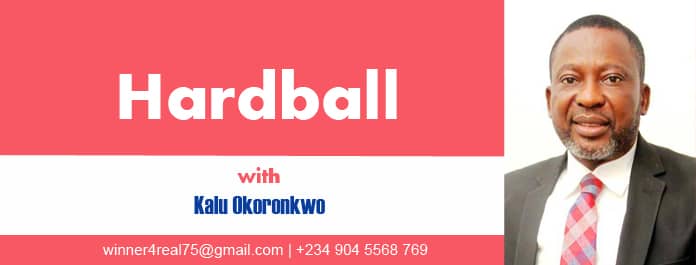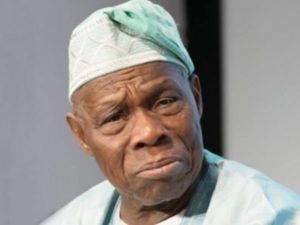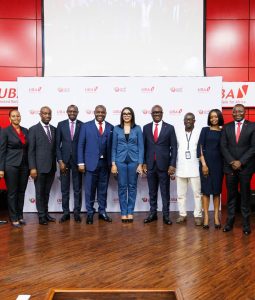
By Kalu Okoronkwo
As a leader, your greatest leadership obligation is succession planning. However, recent happenings in the Nigerian political scenario points to the contrary with an unfolding disquieting narrative: a breed of leaders who prioritize manipulation over genuine leadership, resulting in declining tradition of political mentorship.
The return of democracy in Nigeria in 1999 starting with President Olusegun Obasanjo era till the present government worsened the situation as nurturing of political leaders in Nigeria is no longer based on merit but on imposition with political godfathers in various states, especially outgoing Governors picking their cronies to succeed them.

Historically, political mentorship has been the basis of leadership development, a conduit through which the wisdom of seasoned statesmen is passed down to the next generation. Such could not be said in the Nigerian situation, a nation grappling with the complexities of governance, yet this once important tradition is fading into obscurity, leaving aspiring leaders to navigate treacherous waters without the compass of experience to guide them.
While this article dwells on political mentorship, it is satirical to mention here that this ugly trend is also found in all facets of leadership in Nigeria, be it religious, traditional, private and public organisations, non-governmental bodies, etc.
The dearth of role models who embody integrity, accountability, and a genuine commitment to democratic tenets is very evident in our political landscape. This has created a lacuna which opportunistic figures are quick to exploit to manipulate public opinion, consolidate power, and advance personal agenda as recently witnessed in the fiasco that engulfed leadership transition in Rivers State and such other states with similar leadership alignment.
The emergence of this disconcerting trend: the dearth of political mentorship and the simultaneous rise of manipulative leadership has paved the way for a breed of politicians who manipulate rather than inspire.
Following Nigeria’s independence in 1960, the country’s political landscape was marked by a sense of optimism and the challenge of establishing a united Nigeria. The leaders of that era, such as Nnamdi Azikiwe, Obafemi Awolowo, Abubakar Tafawa Balewa and Ahmadu Bello, played dual roles as both statesmen and mentors. Their wisdom and guidance were crucial in piloting the nascent nation through the complexities of nation-building, fostering unity, and instilling a sense of purpose in the political heirs they nurtured.
Though the advent of military rule in Nigeria cast a long shadow over the nation’s political mentorship journey by stifling democratic institutions, political mentors like Chief Anthony Enahoro and Chief Ayo Adebanjo persevered in nurturing political consciousness and advocating for a return to democratic governance. The struggle against military rule became a rallying point for mentorship, as leaders imparted lessons of resilience and enduring value of democratic ideals.
However, the return to democracy in 1999 marked a watershed for political mentorship in Nigeria. Beneath the surface of Obasanjo’s presidency, shadows of manipulation began to emerge. While his administration made strides in economic reforms, allegations of political interference and strong-arm twisting opposition figures tarnished the democratic veneer. Critics argued that the once lofty ideals of transparency and accountability were being compromised, as political maneuvering took precedence over principled governance.
During Obasanjo’s tenure, the paradox of mentorship and manipulation became increasingly apparent. On one hand, Obasanjo himself had been mentored by political stalwarts such as Chief Obafemi Awolowo and had played a pivotal role in shaping Nigeria’s post-military political landscape. On the other hand, the political climate of his era saw a decline in mentorship, as leaders became more focused on consolidating power than nurturing the next generation.
The erosion of ethical standards and the subversion of checks and balances created a breeding ground for leaders who prioritized personal interests over the common good.
Nigeria has since been grappling with the repercussions of the Obasanjo’s era of leadership dynamics as the nation have been striving to strike a new balance, with leaders cognizant of the pitfalls of manipulation and the importance of revitalizing mentorship as a cornerstone of political development.
Also, during the Obasanjo’s presidency, godfatherism became a prominent feature in Nigerian politics as these godfathers strategically positioned themselves as kingmakers, backing candidates who pledged allegiance to them. In return for support, these candidates often found themselves indebted to their godfathers, leading to a compromise in governance that favored personal agenda over the public good.
The era witnessed the emergence of powerful political figures, often with deep pockets and extensive networks, playing a decisive role in determining who ascended to political offices. These godfathers, having nurtured political alliances, expected unwavering loyalty and influence over policies and appointments in return.
The story of Dr. Chris Ngige and Chris Ubah of Anambra state is a story great box office movies are made. It echoes the broader quest for political autonomy, transparency, and a redefined narrative where the voice of the people reign supreme over the whisperings of political godfather with personal agenda.
Godfatherism manifested in a subtle but pervasive erosion of governance structures. Elected officials, owing their political success to godfathers, found themselves entangled in a constant tug-of-war between serving the public interest and appeasing their benefactors. The result was a compromise of policy decisions, the allocation of resources, and the appointment of key officials—all done with the implicit approval of the godfather.
The nexus between godfatherism and corruption became increasingly evident during this era till date, eroding the leadership principles of mentorship. In the pursuit of political patronage, elected officials succumb to the pressure of their godfathers, leading to the diversion of public funds for personal gain. This intertwining of interests fueled a cycle of corruption that further eroded public trust in government institutions.
Years after Obasanjo’s presidency, the specter of godfatherism has persisted in Nigerian politics. The phenomenon transcended party lines, infiltrating both the ruling and opposition camps. Godfathers continued to play pivotal roles in determining the political fate of candidates, perpetuating a system where allegiance to powerful individuals held more weight than commitment to democratic ideals.
The erosion of political mentorship has broader implications for the health of democratic institutions. Without the steady hand of experienced mentors, leaders may become autocratic, side-stepping accountability and undermining the foundations of a thriving democracy. This erosion poses a severe threat to the democratic ideals that Nigeria aspires to uphold.
A cursory look into the nation’s political landscape reveals that manipulative leadership are stark and the consequences are felt at every level of society, as public discourse becomes polarized, and the pursuit of the common good takes a back seat to personal ambition.
Curbing the rise of manipulative leadership requires a multifaceted approach. First and foremost, there is a pressing need to institute political mentorship programs. This can be achieved through well run political parties with very strong Youth Wings(not political thugs). The political parties of the First and Second republics hand very strong tradition of youth Wing hence we hear of Zikist Movement in NCNC and later NPP and Awoists in Action Group and later UPN. Establishing platforms where seasoned statesmen actively guide and mentor emerging leaders can be a powerful antidote to the prevailing trends.
The electorate must play an active role in demanding transparency, accountability, and ethical conduct from their leaders. Citizens hold the key to breaking the cycle of manipulative leadership, and by fostering an environment that values integrity and collective welfare, they can reshape the political landscape.
The imperative for change in navigating the abyss of manipulative leadership amidst the decline of political mentorship in Nigeria has never been more urgent. The revival of mentorship stands as the only hope and a catalyst for a new era of leadership that prioritizes the common good over individual ambition.
It is through the collective efforts of mentors, aspiring leaders, and citizens alike that Nigeria can steer away from the dangerous currents of manipulation towards a future defined by integrity, accountability, and genuine democratic.
Kalu Okoronkwo, a leadership and good governance advocate writes from Lagos and can be reached via kalu.okoronkwo@gmail.com




临时邮箱公开收件箱功能挺野的——随便输个名字就能看邮件,建议别用来注册‘不可描述’网站(懂的都懂)。
Aw, this was a really nice post. In thought I would like to put in writing like this moreover – taking time and actual effort to make a very good article… however what can I say… I procrastinate alot and certainly not seem to get one thing done.
I discovered your blog site on google and check a few of your early posts. Continue to keep up the very good operate. I just additional up your RSS feed to my MSN News Reader. Seeking forward to reading more from you later on!…
I truly appreciate this post. I’ve been looking everywhere for this! Thank goodness I found it on Bing. You’ve made my day! Thx again
I believe that is one of the most vital information for me. And i am satisfied reading your article. However wanna remark on few common issues, The website taste is perfect, the articles is truly excellent : D. Excellent job, cheers
Enjoyed looking at this, very good stuff, thanks. “Curiosity killed the cat, but for a while I was a suspect.” by Steven Wright.
Hi there, constantly i used to check webpage posts here in the early
hours in the break of day, as i like to find out more and more.
Hi, I do believe this is an excellent web site.
I stumbledupon it 😉 I’m going to come back once again since i have saved as a favorite it.
Money and freedom is the best way to change, may you
be rich and continue to guide other people.
Have you ever thought about publishing an e-book or guest authoring on other sites?
I have a blog centered on the same ideas you discuss and would really
like to have you share some stories/information. I know my readers would appreciate your work.
If you’re even remotely interested, feel free to shoot me an e mail.
I’m really impressed together with your writing abilities as smartly
as with the structure to your weblog. Is this a paid theme or did
you modify it yourself? Either way keep up the nice high quality writing,
it is uncommon to look a nice blog like this one today..
Greate post. Keep writing such kind of info on your blog.
Im really impressed by it.
Hello there, You have performed an excellent job.
I will definitely digg it and individually recommend
to my friends. I am sure they’ll be benefited from this web site.
Nice post. I learn something totally new and challenging on sites I stumbleupon every
day. It’s always useful to read through articles from other authors and practice something from their sites.
My family every time say that I am killing my time here at
net, however I know I am getting experience every day
by reading such pleasant articles or reviews.
Hi there, after reading this amazing piece of writing i am also happy to share my know-how here with friends.
It’s actually very complex in this active life to listen news on Television, so I only
use internet for that reason, and obtain the hottest information.
This page truly has all of the information and facts I needed
concerning this subject and didn’t know who to ask.
Nice post. I learn something totally new and challenging on sites I stumbleupon every day.
It’s always useful to read articles from other writers and practice a
little something from their websites.
What i don’t understood is actually how you’re now not really much more well-preferred than you may be right now. You are very intelligent. You already know therefore considerably in terms of this subject, made me personally consider it from a lot of various angles. Its like women and men aren’t involved unless it is something to do with Lady gaga! Your individual stuffs great. All the time deal with it up!
Heya this is somewhat of off topic but I was wanting to know if blogs use WYSIWYG editors or if you have to manually code with HTML. I’m starting a blog soon but have no coding knowledge so I wanted to get advice from someone with experience. Any help would be enormously appreciated!
Your style is so unique compared to many other people. Thank you for publishing when you have the opportunity,Guess I will just make this bookmarked.2
Your place is valueble for me. Thanks!…
Very nice post. I simply stumbled upon your weblog and wished to say that I have truly loved surfing around your blog posts. After all I’ll be subscribing to your feed and I am hoping you write again soon!
I’ve been exploring for a bit for any high-quality articles or blog posts in this kind of space . Exploring in Yahoo I finally stumbled upon this website. Studying this information So i am happy to express that I have an incredibly excellent uncanny feeling I found out just what I needed. I most unquestionably will make certain to don’t omit this web site and provides it a glance on a constant basis.
I respect your work, regards for all the interesting articles.
I discovered your blog site on google and check a few of your early posts. Continue to keep up the very good operate. I just additional up your RSS feed to my MSN News Reader. Seeking forward to reading more from you later on!…
Hello my loved one! I wish to say that this post is amazing, great written and include approximately all important infos. I would like to peer extra posts like this .
You completed various good points there. I did a search on the topic and found the majority of people will go along with with your blog.
I’ve been exploring for a little for any high-quality articles or weblog posts on this kind of area . Exploring in Yahoo I finally stumbled upon this web site. Studying this information So i am glad to convey that I’ve a very good uncanny feeling I came upon exactly what I needed. I most without a doubt will make sure to do not fail to remember this website and give it a look regularly.
Valuable info. Lucky me I found your web site by accident, and I am shocked why this accident didn’t happened earlier! I bookmarked it.
Good info. Lucky me I reach on your website by accident, I bookmarked it.
Simply a smiling visitant here to share the love (:, btw outstanding style and design.